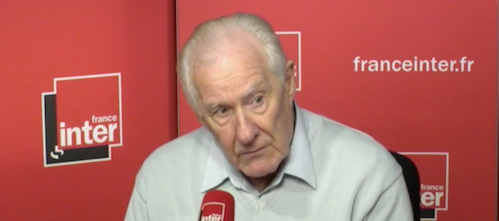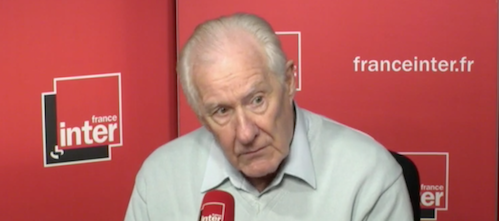For Alain Badiou, "Pokemon Go is the corruption of corruption"

Alain Badiou was Ali Baddou’s guest on France Inter on 9 September.
As defendant, Mr. Badiou — profession, philosopher — do you admit having wanted to corrupt the youth, together with your accomplice Socrates?
Yes, if by "corruption" we mean proposing to the youth that it seek out its own way, by itself, by discussing it, thinking about it and reflecting on it rather than following the path already traced out by its predecessors, by governments, by the authorities and by tradition. The philosopher is supposed to corrupt youth — in a sense that is his job, his professional task.
But, let us be sure, that does not mean corruption by sex or money?
No, no, no. That’s another question. Philosophy is a more profound, radical, essential corruption than that. Fundamentally the more ‘ordinary’ corruption you mention is part of the state of things, whereas the corruption the philosopher aims at is more uncertain and more difficult to obtain.
What is it to be young today, Alain Badiou? Does it just mean — as Hugo had it — having "triumphant mornings"?
No, that was a rather voluptuous reference to certain aspects of youth [laughter]. And obviously that’s something you have to have … I am suggesting that to be young today is to be caught in a sort of contradictory difficulty, a sort of principal contradiction. On the one hand, fundamentally the dominant tendency is to say that to be young is to prepare your integration into society, to seek a good position in the world such as it is…
To study well, the way to get a good job…
Well yes, exactly, today studying well is preparation, a way of getting ahead professionally. And then ultimately it means being a "winner" and not a "loser" in a fundamentally competitive society. It means setting up a start-up that ends up making profits on the stock markets etc. That’s one version of things. And as against that, evidently, there is a classic nihilist reaction, "No Future," I’ll do what I want, and ultimately I’ll burn through life…
You’re going to annoy people, anger them…
Why?
Because you’re telling them that sex, that shitty spliffs in the housing estates, games…
Well don’t make out I’m on the side of an imbecile puritanism. To tear through your life, to burn through it, can be something rather grand. That was what the early Rimbaud was before he became a colonial trafficker — like everyone I might say. But before that he burned through life and that had a creative dimension. It is simply that such a youth consuming itself does not prepare any adult life, any professional life etc. I think that the very visible choice today made by youth — which I know through my children and my students — between either finding a good position or else stagnating a little in a kind of eternal adolescence that eats itself up — well, that’s the situation, and that is the situation that philosophers try to corrupt.
You don’t go jogging, to the gym — you’ve never been to a plastic surgeon?
No…
Not yet?
No, perhaps that’s a pity, you tell me…
Not at all, you’re an eternal youngster. But it’s surprising what you write, that society has a cult of youth but we’re also afraid of it
Yes, what is striking today is that our cult of youth, the will to be forever young, is inherent to the whole society — you have to be able to remain a fighter your whole life, and even at my age you still have to keep presenting yourself as someone who can fight in a harsh and competitive society and win successes, and so you have to run, jog, play tennis and all that, you have to debase yourself a bit to remain presentable. That’s one thing. But on the other hand youth causes fear, as we well know…
In what sense?
The terrible youth in the working-class districts…
But that’s not just any youth
Well even so I think it’s mainly the youth of the famous "banlieue," this mysterious place from which anything might arise at any moment — torched cars, terrorists, etc. And this combination is very striking. A cult of youth that fundamentally applies to the dominant, to celebrities, the people we see every day, and on the other hand considers the mass of youth, the most numerous and the most real, with suspicion. Often meaning a policing suspicion.
France has a fine tradition of demonstrating, and you call for a rather incredible, very original demonstration — we’d like to see it in the streets — namely a demonstration of youth and the elderly together, against adults
Yes, I think that today adults can be suspected of desiring a kind of listless integration into this highly questionable world. On the contrary there exist some old codgers, including myself, who remember a very different era, spending our youth amidst idealism, effectively something that was like a proposal for life, in the 1970s. That ended with what I would call a "restorationist" period in the 1980s — when what I mentioned at the beginning was restored and redone. And we are still very much stuck in that. There is a youth, or part of it, despairing of that, and which hopes — I have seen it all over — that something of what happened in the 1970s is transmitted over to it. Not as in the regime of a mortifying illusion and all that, but the things that were not all that bad.
Are you sure, Alain Badiou? Every day for weeks young people have been meeting up in France and elsewhere, coming out onto the streets with a sense of urgency … not to attack the Labour Law but to play Pokemon Go.
Pah! Well that’s the corruption of corruption, if I might put it like that… To have the will to want to do something and then slip into a harmful trap — the most remarkable kind, the trap of the invisible, of the visible and finally the trap of the image. And that’s also something we can say about youth. They still cover their heads [the verb he uses can mean either put on a helmet or put on headphones], but no longer to fight the police, but to listen to nonsense. And a youth that is very sensitive to the world of images — well, that’s an old fight of Plato’s, the fight against images. He foresaw that already, that the world was like a great cinema, people watching the shadows in the cave.
Do you call on youth to revolt, to change the world, through voting at the ballot box?
Listen… If I said that I would risk letting down my audience. For every day we see that change through the ballot box very much resembles stagnation.
And you, citizen Badiou, will you vote?
I have not voted since 1968, and think I am too old to fall back in line.
So for you there’s no difference between a Socialist president, a right-wing one or a far-Right one?
I would not exactly say that. I would not say that there is no difference. I would say that on the fundamental choices, the essential orientation of society, there is no longer any difference. That is the reason why this system is shaken and crisis-ridden. It is shaken and in crisis not only for economic reasons etc., but also as a political system. If once it was a system supposed to give you some choice on the fundamentals, the last time that happened was in 1981, when everyone still felt they were faced with essential choices. Today we have ten candidates who are like different hues of the same colour.
It is forty years to the day since Mao’s death. The young Alain Badiou was a Maoist — is he still one today?
It does not mean a lot to be a Maoist today, if not the cult of past landmarks. But for a whole section of youth Mao represented something very specific, a non-Stalinist version of communism, something that went beyond or differentiated itself from Stalin.
And you refuse to count the dead?
No, I’m perfectly willing to count the dead, but how about we count them on the other side, too? Count them on both sides. I lived my youth during the Algerian War, when they were torturing people in Paris police stations, racking up a death toll in Algeria reaching many hundreds of thousands, devastating the country and deporting people. So the truth is, in history, that everyone is up to their ears in bloodshed.
Do you miss your fine, sweet, chaotic youth?
Listen, I don’t think there’s any point missing one’s youth, if we are to be faithful. I love my youth, I have a lot of tender feelings toward it. But the world is such as it is. And we have to transmit to the youth what that world was — and then they will do what they like with it.